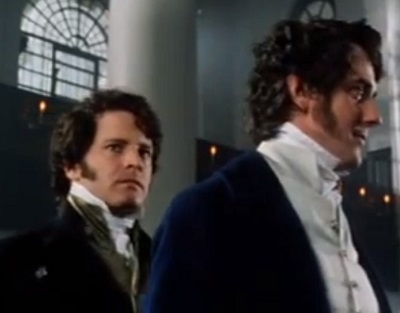All The World’s A Stage
Here is my latest post on Always Austen. Shakespeare, theatre, the roles we play, and oh yes, a new novel about our favourite solider, Colonel Fitzwilliam!
We just returned home from our second visit of the summer to the Stratford Festival here in Ontario to end the summer with a celebration of theatre. This time, it was all Shakespeare! The festival—being in a place called Stratford, which is most conveniently on the River Avon—concentrates on The Bard’s works, and has a commitment to performing all his plays over the course of several years. This year, they had three on stage: As You Like It, Macbeth, and The Winter’s Tale. We went to all three.

The Stratford Festival is also dedicated to putting on world-class productions of whatever they do, and these three plays were no exceptions. I was not crazy about this season’s interpretation of Macbeth, set as it was in a series of motorcycle gang wars, but I can’t fault the production values or acting. The Winter’s Tale, a play I didn’t know at all, was magical, hilarious, and heartbreaking all at once, and As You Like It is now a strong contender for my drama-loving kid’s Favourite Shakespeare Ever.
 A Scene from ‘As You Like It’ by William Shakespeare
A Scene from ‘As You Like It’ by William ShakespeareWilliam Hamilton
It was also an emotionally full weekend in a lot of ways.
It was my daughter’s last weekend at home before returning to the UK for another year of university, and I’m going to miss her dreadfully. An elderly relative is not doing well and things came to a bit of a crisis while we were away, one which will take a great amount of time and mental energy to resolve in far too little time. And—for some great news—my son got engaged.
So not all the drama was taking place on the stage.
This got me thinking about Shakespeare’s famous line from As You Like It:
All the world’s a stage,
And all the men and women merely players…
(Act II Scene VII Line 139-40)
How true this is. In the play, the speaker goes on to examine how we all play different parts through our lives, from children to adults and back to second childhoods, which is rather where our elderly relation is now. But even at any one time in our lives, we have different roles and put on different masks for different circumstances.
For example, I don’t know if I wear the same mask as a writer as I do when I’m a frustrated mother complaining that my kids aren’t washing the dishes, or when I lend a sympathetic ear to a friend going through a rough time.
Literary characters wear different masks as well.
The first to come to mind is Mr Darcy, whose mask of arrogance and cold disdain masks a kind and loyal friend. Willoughby from Sense and Sensibility plays the part of the dashing beau, when he is really a cruel seducer. We won’t talk about Wickham. He makes a whole career of playing to his audience.

I have also just finished the latest round of edits on my upcoming Pride and Prejudice variation. There is still work to be done, but I have a wonderful cover already and I hope to release A Soldier’s Tale by the end of the year.
This novel stars our favourite colonel, Darcy’s cousin Richard Fitzwilliam. And as I thought about the plays we’ve seen, I came to realise that he also plays different roles in his world.
He is a son, striving to be free of his father’s control. He is a soldier, desperately wishing to serve his country where he is needed, but tethered to England’s soil by his father’s machinations. He is a good friend to his cousin Darcy and a loving guardian to Darcy’s sister Georgiana. And he is a man, nursing a broken heart and faced with a perplexing antagonist on a piece of paradise in the middle of the Atlantic Ocean.
After so many struggles to be sent to a posting overseas, Richard finds himself not on the Continent fighting Napoleon, or in the New World where tensions are simmering, but in Bermuda, with its crystal blue waters and shimmering pink sands. It is far from the heart of battle that he wants, but the Dockyard in the protected harbour is key to Britain’s naval power, and it is an important position.
 Beautiful Bermuda
Beautiful BermudaNor is Richard ignorant of Shakespeare. Bermuda is thought to be the inspiration for Prospero’s magical island in The Tempest, and this is at the forefront of his mind as he starts to explore his new home.
Here is an excerpt from A Soldier’s Tale, hopefully coming out later this year.
***
This was the unnamed magical isle of Shakespeare’s Tempest, a place of wonder and illusion, where great things might happen in a land of fruitfulness and plenty. It was beautiful, exotic, and up to now, safe.
Richard hated it.
This posting had been the only one to which his commander had the authorisation to send him. No matter how much he had pleaded to be sent to some theatre of war, his father’s influence was too strong. Other men of his rank and higher had somehow found themselves in perilous places; marquesses and dukes sent their sons off to fight Napoleon’s brutal forces, and took pride in their service to King and Country. His old schoolmate Ackley’s father, Lord Aysthill, was almost eager to see him go. But Richard’s own father and Aysthill were very different men, and the Earl of Matlock had his fingers deep within the workings of the Home Office. No, the Earl of Matlock had spoken, and this was as close as he would allow his son to come to battle.
Battle might still happen, of course. The Atlantic was no safe place for ships of either British of French flag, and the Americans to the west were rattling the sabre as well. It would not be long until the war crossed to the New World, and then this green and enchanted isle might well be stained red.
Britain was prepared for this. With the Dockyards to this end, and Fort St. Catherine and the nearby Gates Fort at the far eastern end of the colony, the entire colony was protected. There was little question about why this should be the great harbour for the British fleet in middle of the Atlantic.
The more Richard considered this, the more he was reconciled to his posting. This was no useless role, after all, not like his commands in England had been, training boys to walk in straight lines. He would soon be martialling not only soldiers, but scores of workers as well, coordinating training exercises, sending out scouting missions, advising on strategy, and leading real soldiers in a location that might very well soon see war. Perhaps this would be a tolerable place to build his career after all.
Nor could it be ignored that this posting had come with the added stripes and braids of a promotion, and Lieutenant Colonel was not a rank at which to sneer. Even Miss Ingalls, cruel and overreaching as she was, must be impressed by it. Not that she would have the chance to congratulate him. Richard was quite finished with her and her ilk.
He tossed these musings aside and pulled his hat low over his eyes. It was not quite sufficient to shield him from the bright sunshine, but it would do for now. Perhaps in his wanderings, he might find a place to purchase one of the wider-brimmed sort he saw many of the local men wearing. Light in colour and made of straw, they would serve this climate better than what he had brought with him from England.
Yes, that was a grand purpose for this foray out along the string of islets, and the village of Somerset would surely be his proposed destination. He took his leave at the gate that was so nearly complete, and started down the path to the village. It was not yet noon, and the day promised to be warm but not too hot, especially under the canopy of trees. After the enforced confinement of the ship, and then his days lurking about the fortifications, he revelled in the exercise. Each stride loosened muscles that had long been protesting, and the caress of the sun on his back warmed more than his limbs.
He was here, further from England than ever he had been before, finally out of his father’s reach. He had his colonel to answer to, of course, but now, at this moment, he was entirely independent, going wherever he wished to direct his steps, needing to heed nobody. It was a fine thing, indeed, and he was pleased to allow his mind to wander as freely as his feet.
As he walked, bright sparkles of sunlight drew his attention from the water, snatches of which he could spy through the surrounding foliage, casting the day in a sort of mystical aura. He laughed at himself; for a moment, he could even believe that Prospero himself, Shakespeare’s sorcerer of the magical isle, were commanding the elements, such was the startling effect. In his mind’s eye, he pictured lovely Miranda floating before him through the bushes, waiting to command some spirit to do her bidding.
He could almost see her, slim but with a woman’s form, not too tall, neither too short, her hair hidden beneath a flower-trimmed bonnet, her dress pale and light and suitable for the clime as she traced the path far ahead of him. What a fancy! Once more, he chuckled to himself as another glint of bright reflected sunlight flashed into his eyes.
Then the image stumbled on a fallen branch and exclaimed something Richard could not fully hear. It seemed, however, that the image had a good salty vocabulary. Such was the peril of living in a military base.
“Miss Barrow!” Richard called to her across the separating gap. She spun about to see who was calling.
Miss Barrow was the daughter of the commanding colonel at the Dockyard. Richard had been introduced to her and her mother shortly after his arrival, but he had, thus far, no cause to engage in any sort of conversation beyond, ‘How do you do?’ and ‘Very well thank you.’ The lady was not very young—perhaps two or three years younger than himself—and seemed, by her residence at the fort, to have resigned herself to a life of spinsterhood.
If she had aspirations of marriage, surely she would have found an aunt or cousin with whom to live in England, where she might meet some eligible gentleman in want of a wife. Here, in Bermuda, and despite the wealth of officers, such that were seeking a spouse were few.
Miss Barrow looked back at him, her expression unreadable. This was their first encounter out of doors, and she looked different in the sunshine. In the dappled light under the trees, Richard saw the sun pick out hair of medium brown, and when he got closer, he could see her eyes were a bright greenish hazel. She was not beautiful, not in that heart-stopping manner, but neither was she plain. Her features were regular and not unappealing, and her lashes thick and dark. But he could no longer look at a woman’s face without the unwitting comparison with that of Honoria Ingalls, callous thought she might be, and every other such face paled in contrast. Miss Barrow held no candle to that cruel beauty.
***
What roles do you play? Do you agree with Shakespeare? I’d love to hear your thoughts.



